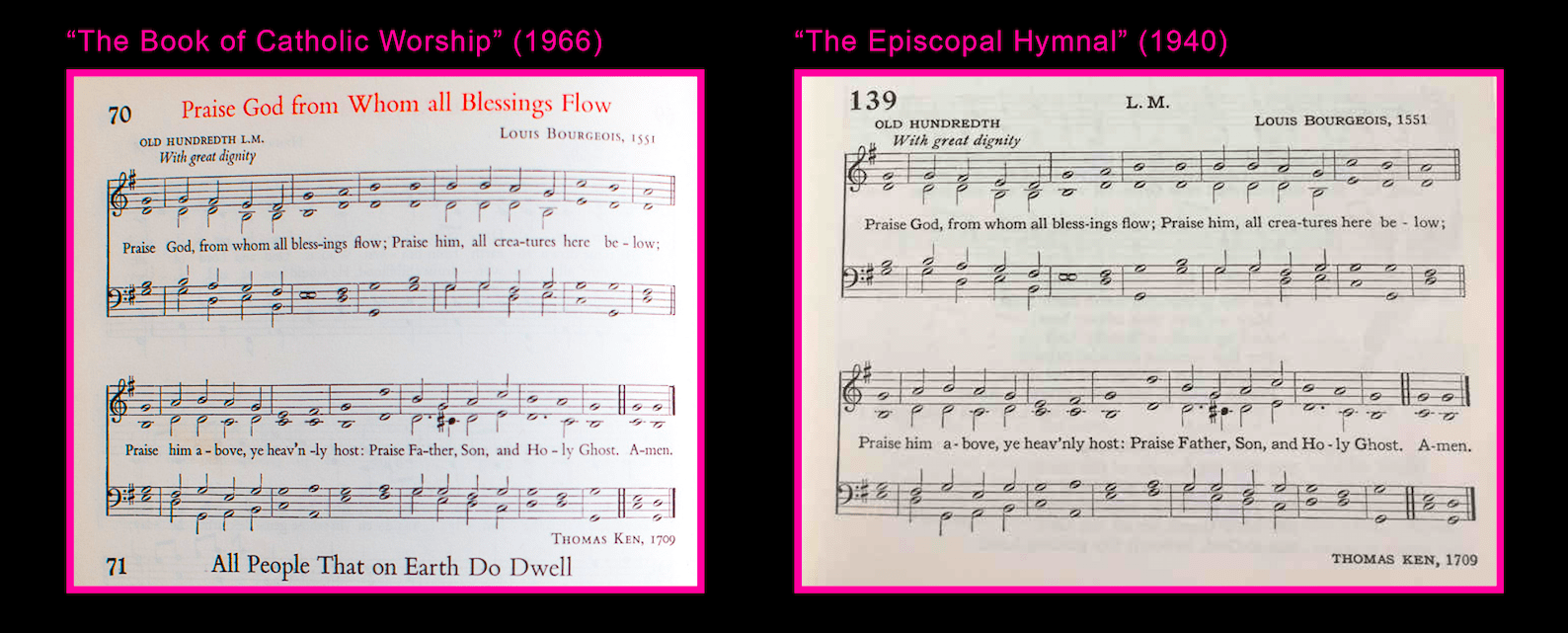 ASCINATING. That is the only word I can use to describe a book recently given to me called “The Book Of Catholic Worship.” It bears a 12 January 1966 IMPRIMATUR from Most Rev. Lawrence Shehan (d. 1984), the Archbishop of Baltimore, who—it seems fair to say—ended up with a stained history. I don’t need to describe to our readers that 1966 was an absolutely crucial year for liturgical reform. The characters who assembled the book were a “mixed bag”—and that is often what we see vis-à-vis 1960s musical committees. For example, we find members who were liturgically “conservative” (such as Sister Josephine Morgan of the Pius X School of Liturgical Music). Yet, we also find members like Father Eugene A. Walsh, who later became a formal heretic for teaching that the assembly—not the priest—consecrates the SANCTISSIMUM during Holy Mass. 1
ASCINATING. That is the only word I can use to describe a book recently given to me called “The Book Of Catholic Worship.” It bears a 12 January 1966 IMPRIMATUR from Most Rev. Lawrence Shehan (d. 1984), the Archbishop of Baltimore, who—it seems fair to say—ended up with a stained history. I don’t need to describe to our readers that 1966 was an absolutely crucial year for liturgical reform. The characters who assembled the book were a “mixed bag”—and that is often what we see vis-à-vis 1960s musical committees. For example, we find members who were liturgically “conservative” (such as Sister Josephine Morgan of the Pius X School of Liturgical Music). Yet, we also find members like Father Eugene A. Walsh, who later became a formal heretic for teaching that the assembly—not the priest—consecrates the SANCTISSIMUM during Holy Mass. 1
* PDF Download • BOOK OF CATHOLIC WORSHIP (1966)
—This PDF file contains the “Hymnal” section, but the other sections are not included.
![]()
In Daniel Craig’s Comparison of 15 traditional Catholic hymnals, he spilled quite a bit of ink describing what he called “The ADOREMUS-50”. I’m not going to attempt to repeat everything Mr. Craig said, but this 1966 hymn book seems to match the “ADOREMUS-50” in a way that’s almost scary!
Do you agree?

Shocking Theft
I was absolutely shocked—flabbergasted, even!—to observe that The Book of Catholic Worship did something very sneaky. They stole all their hymns from the 1940 Episcopal Hymnal. Technically they did acknowledge this, but only if somebody realizes what “The Church Pension Fund” is all about. Here is proof is what I am saying:
I could easily give 50 more examples, but here’s just one more—and examine the lyrics closely to discover the vandalism they thought they could get away with:
Almost without exception, the PROPRIUM MISSAE are taken from the 1965 Missale Romanum, which provides an official English translation of the Roman Gradual, approved for liturgical use in the United States of America. We have discussed this topic over and over again. Here is proof they took their antiphon translations from the 1965 Roman Missal:
Here is more proof; the REPROACHES from Good Friday:
I said “almost without exception” because I have noticed a few items which do not come from the 1965 Roman Missal, such as the English translation of the Pange Lingua from Good Friday. By the way, if enough people show interest, I would like to scan (and upload) all 809 pages of the “Book of Catholic Worship” (1966)…but only if enough people show interest.

 HROUGHOUT the past five years, we have examined the history of Catholic hymnody. We have seen that until about 1962, most Catholic hymnals never used Protestant texts or translations. If they did use them, the editors tried to disguise them. An example we looked at was Father Bonvin’s Hosanna Hymnal, published in 1914 (St. Louis, Missouri). We spoke about how Father Bonvin tried to hide what he did. I recently discovered a PDF file which I have never shared with you, a Catholic hymnal granted IMPRIMATUR by Most Rev’d William Joseph Walsh, Archbishop of Dublin from 1885-1921. This hymnal has the name: Vox Angelica: A New Collection of Catholic hymns (organ edition). I don’t know anything about the person who created this Catholic hymnal, but I can say that it’s remarkable in terms of its heavy inclusion of Protestant hymnody. When this Dublin hymn book appeared in 1913, including even translations by Protestants was incredibly rare. But we have already discussed this, so I won’t belabor the point…
HROUGHOUT the past five years, we have examined the history of Catholic hymnody. We have seen that until about 1962, most Catholic hymnals never used Protestant texts or translations. If they did use them, the editors tried to disguise them. An example we looked at was Father Bonvin’s Hosanna Hymnal, published in 1914 (St. Louis, Missouri). We spoke about how Father Bonvin tried to hide what he did. I recently discovered a PDF file which I have never shared with you, a Catholic hymnal granted IMPRIMATUR by Most Rev’d William Joseph Walsh, Archbishop of Dublin from 1885-1921. This hymnal has the name: Vox Angelica: A New Collection of Catholic hymns (organ edition). I don’t know anything about the person who created this Catholic hymnal, but I can say that it’s remarkable in terms of its heavy inclusion of Protestant hymnody. When this Dublin hymn book appeared in 1913, including even translations by Protestants was incredibly rare. But we have already discussed this, so I won’t belabor the point…

NOTES FROM THIS ARTICLE:
1 I don’t know all the members, but the names of several of them—such as Gabe Huck and Father Godfrey Diekmann (who later supported women’s ordination)—are extremely troubling. They should not have been allowed anywhere near a liturgical project!





